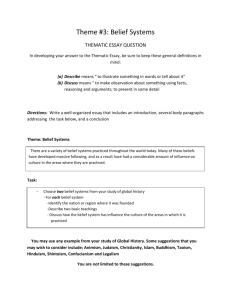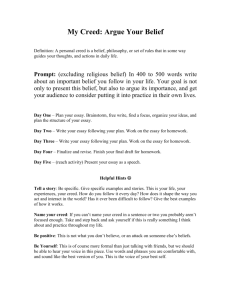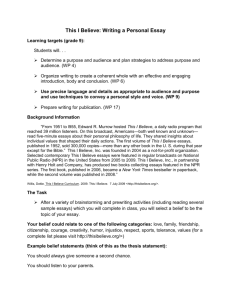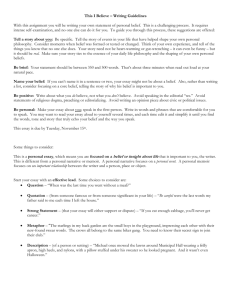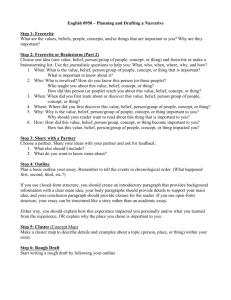2015_McGrane_This I Believe Project
advertisement
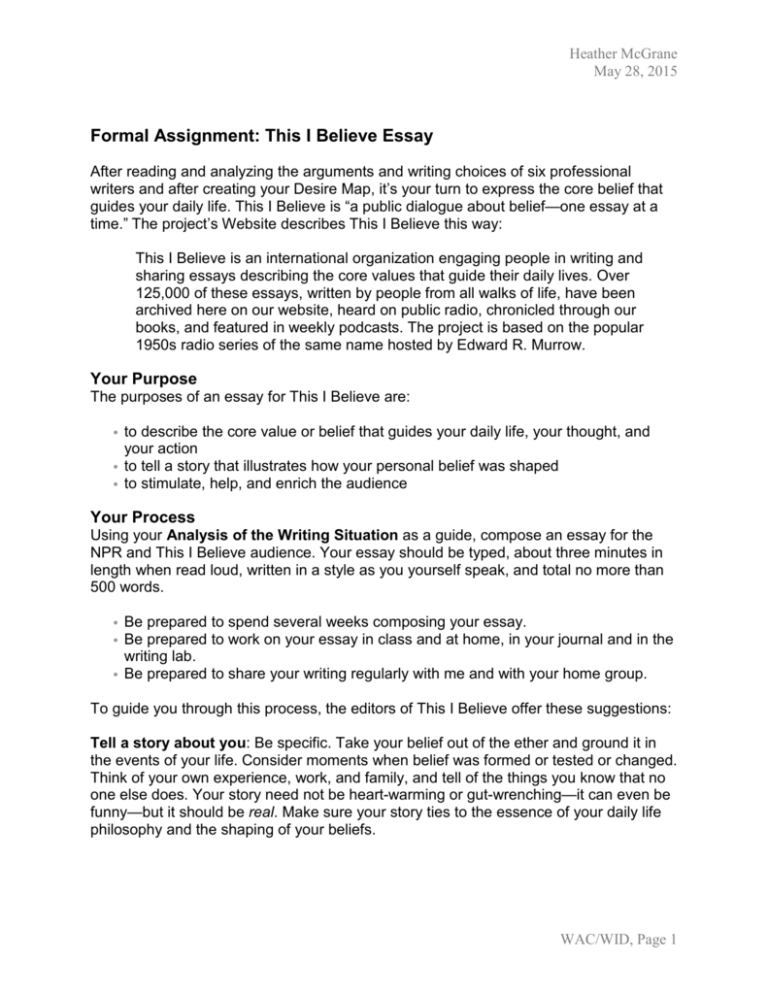
Heather McGrane May 28, 2015 Formal Assignment: This I Believe Essay After reading and analyzing the arguments and writing choices of six professional writers and after creating your Desire Map, it’s your turn to express the core belief that guides your daily life. This I Believe is “a public dialogue about belief—one essay at a time.” The project’s Website describes This I Believe this way: This I Believe is an international organization engaging people in writing and sharing essays describing the core values that guide their daily lives. Over 125,000 of these essays, written by people from all walks of life, have been archived here on our website, heard on public radio, chronicled through our books, and featured in weekly podcasts. The project is based on the popular 1950s radio series of the same name hosted by Edward R. Murrow. Your Purpose The purposes of an essay for This I Believe are: • to describe the core value or belief that guides your daily life, your thought, and your action • to tell a story that illustrates how your personal belief was shaped • to stimulate, help, and enrich the audience Your Process Using your Analysis of the Writing Situation as a guide, compose an essay for the NPR and This I Believe audience. Your essay should be typed, about three minutes in length when read loud, written in a style as you yourself speak, and total no more than 500 words. • Be prepared to spend several weeks composing your essay. • Be prepared to work on your essay in class and at home, in your journal and in the writing lab. • Be prepared to share your writing regularly with me and with your home group. To guide you through this process, the editors of This I Believe offer these suggestions: Tell a story about you: Be specific. Take your belief out of the ether and ground it in the events of your life. Consider moments when belief was formed or tested or changed. Think of your own experience, work, and family, and tell of the things you know that no one else does. Your story need not be heart-warming or gut-wrenching—it can even be funny—but it should be real. Make sure your story ties to the essence of your daily life philosophy and the shaping of your beliefs. WAC/WID, Page 1 Heather McGrane May 28, 2015 Name your belief: If you can’t name it in a sentence or two, your essay might not be about belief. Also, rather than writing a list, consider focusing on one core belief, because three minutes (500 words) is a very short time. Be positive: Please avoid preaching or editorializing. Tell us what you do believe, not what you don’t believe. We do not want a sermon; we do not want editorializing or finger-pointing. We do not even want your views on the American way of life, or democracy or free enterprise. These are important but for another occasion. We want to know what you live by. Avoid speaking in the editorial “we.” Make your essay about you; speak in the first person. Be personal: Write in words and phrases that are comfortable for you to speak. We recommend you read your essay aloud to yourself several times, and each time edit it and simplify it until you find the words, tone, and story that truly echo your belief and the way you speak. Submission • submit your essay online to the This I Believe Website • include a 100 word biography. Example: Jeff Sloan is editor of a technical magazine serving the composites manufacturing industry. In his modest spare time he coaches and plays soccer, rides his bike, loves to cook, and bakes a mean loaf of bread. He lives in Pueblo West, Colorado, with his wife, Sheila, and sons, Thomas, Jacob, and Isaac. • read your essay to the class during a public presentation Evaluation Criteria This I Believe is the capstone writing project in ENC 1101. You must successfully complete this project to pass the class. Bring all of your skills in critical thinking and composing for specific rhetorical situations to the writing process. Your essay will be ready for submission to This I Believe when you: • name your belief in a sentence or two • include lots of evidence: concrete, specific details like reasons, examples, names, numbers and senses • ground your belief in a story: moments or events of your life that explain how your belief was formed or when it was tested • tie your belief and your story to your daily life • write concisely, in no more than 500 words • present a polished text using English mechanics (capital letters, standard spelling, and punctuation) • participate in 85% of the writing workshops WAC/WID, Page 2
